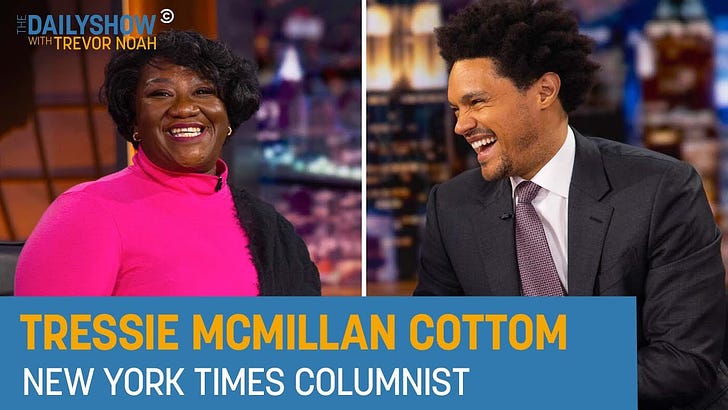On Monday, Tressie McMillan Cottom made an appearance on The Daily Show with Trevor Noah to discuss the illusion of Twitter as a public space. She shared her thoughts on Twitter, how she thinks about its role in society, how she teaches her students to think critically about the world they live in, and why she believes people are inherently curious.
Though Twitter may feel like a public square, we know it can’t be one because it is not owned by the state or the people — it is outsourced to the private sector. In talking about how libraries serve as good public spaces, she noted:
We are in an information society. Information is power and it is money. Why don’t we have a civic public square that exists on the internet?
It’s been an interesting time for Twitter. Though it’s not perfect, McMillan Cottom discussed how the platform has allowed others to share the vulnerability of learning something new. “It was a space for people to see different kinds of genius. That you could be good in one domain, still learning in another domain, that you could risk it,” she says.
People’s curiosity and eagerness to learn have impacted social media in different ways. She said that “what [Twitter] has done is made our curiosity profitable, and it has made our curiosity politically polarized, but that doesn’t mean that curiosity is bad.”
Watch the full interview:
This conversation helped cap Trevor Noah’s tenure as the Daily Show host. In his final episode last night, he took a moment to thank all the Black women who shaped his life. On Twitter (appropriately), Tressie offered one last thread on their friendship:
When you see how many Black women he elevated? That’s him. That’s who he reads. He is the opposite of Girl 6. Black women are truly the foundation of his intellectual project.
Publications and appearances
“A lot of the time, debunking information repeats the false information itself.” Alice Marwick spoke to Forward about Kanye West’s antisemitism and how providing context for conspiracy theories risks spreading them.
“Our relationships don’t stay confined to the internet or not on the internet, our relationships happen everywhere all at once.” Alice Marwick spoke to the New York Times about Americans spending more time alone and how different mediums help keep up with relationships.
“Some things can get fixed by media literacy – understanding how search engines work, recognizing the role keywords play. But really taking a look at the relationship between disinformation and racism and sexism, especially in the United States is the first step.” Francesca Tripodi appeared on the Conspirituality podcast to discuss right-wing propaganda, Ye, and more.
Affiliates Matt Perault and Scott Babwah Brennen released a new report examining recent state action in privacy, content moderation, child safety, antitrust, and taxation.
Affiliate Matt Perault’s new piece for the Wall Street Journal analyzes what we might learn from tech regulation in Europe.
Affiliate Jessica Mahone, research director at UNC’s Center for Innovation and Sustainability in Local Media (CISLM), and her colleagues published a full research report on North Carolina’s journalism workforce.
Affiliate Daniel Johnson contributed to the reporting of the attack on power stations in Carthage, North Carolina for the New York Times.
Coming soon
December 18: The Platform Governance Research Network’s deadline for abstracts.
May 30, 2023: Release date for Alice Marwick’s The Private Is Political: Networked Privacy and Social Media.
Rest of Web
The International Women’s Media Foundation released a mental health guide for journalists facing online violence.
We’re reading Siva Vaidhyanathan’s latest article on white supremacy and fighting for America’s democracy.




